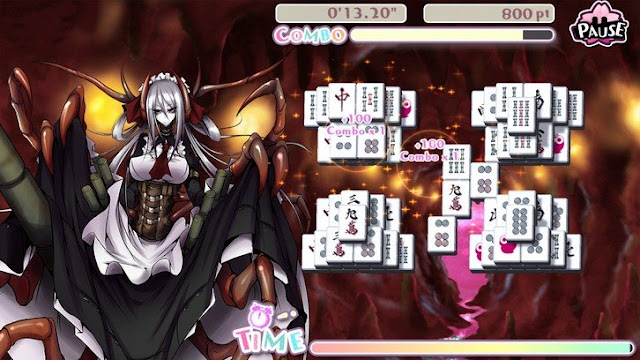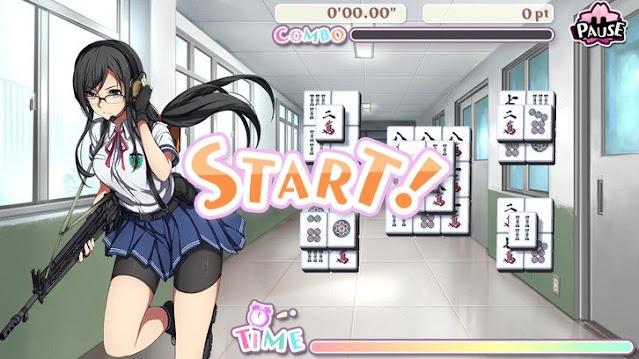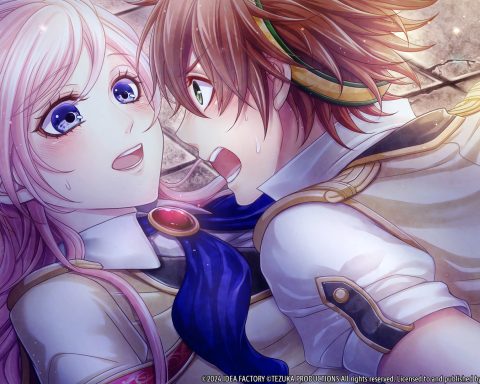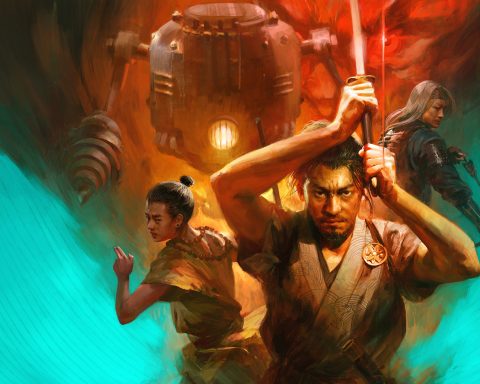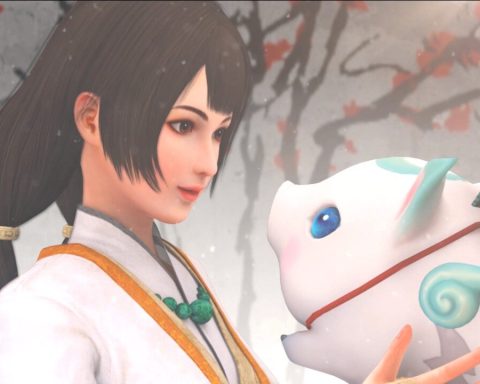One of the great problems we come across as game critics is what we do with games that are indistinguishably similar to something that’s come before. I don’t just mean “inspired by” or “a homage to,” and I don’t even mean superficially different. I mean the exact same game. Do we mark it down for being the exact same thing, or do we continue to celebrate it (assuming that we liked it in the first place)? That’s the conundrum I am in with Bishoujo Battle Mahjong Solitaire.
This is the exact same game as Zoo’s Delicious! Pretty Girls Mahjong Solitaire (thankfully it’s the same developer, so there’s no plagiarism here). The girls that form the central hook to these games are different, but since there’s no narrative nor characterisation that doesn’t actually matter. Both games feature sets of pretty anime girls, and by playing Mahjong really well you get to see them wearing different costumes. It’s great if you enjoy Mahjong Solitaire (which I do), but it is the exact same game as the other one. So I’m going to be lazy here and just post my review from that game with screenshots from this one:
The gameplay itself is standard Mahjong Solitaire stuff. There’s a layout of Mahjong tiles, and you need to match up those that are “open” (i.e. aren’t blocked by surrounding tiles or hidden underneath another tile stacked on top of it). With each match, the tiles are removed from the board, and the end goal is to remove them all. Pretty Girls Mahjong throws a fairly tight time limit into the mix, forcing you to think quickly, but also rewards confident, fast play, because by matching tiles in quick succession to one another, you can build up a “bonus” meter, which results in a better score at the end of the board, if you clear it completely.
Now, I’ve never been entirely sold on time limits for Mahjong Solitaire. The nature of the game is such that it’s possible to snooker yourself by removing tiles in the wrong order, and if you do that so much as once, it’s going to result in an incompletable board. What’s more, you won’t necessarily know that for a number of moves later, leading to a sense of wasted time. As a game, I think I prefer Mahjong Solitaire to be serene and reflective in pace (i.e, without time limits), and while I understand the additional value in giving players a leader board to move up, there were times where I was frustrating myself with being unable to clear boards, because I was being encouraged to react to tile matches I spot, rather than think about how to tackle the board in front of me. Timers work for Bejewelled and other match-3-likes. It’s a little at odds with Mahjong Solitaire on a conceptual level.
(And yes, there is an untimed “easy mode”, but that is clearly not how the developers intended the game to be played, and easy mode comes with other simplifications that I’m not keen on, so it’s not really a solution to my issue with turning Mahjong Solitaire into an arcade game.
With that being said, this game is a lot of fun to play, and that’s for three significant reasons; firstly, those leaderboards are compelling, because your score is only registered after completing three separate rounds of Mahjong, so it’s possible to finesse some very impressive scores indeed through sustained play. Secondly, the tiles themselves are beautifully rendered on the Switch and I really love the aesthetics of Mahjong. I have a set of my own and no one to play with, but I also don’t care because I simply enjoy how Mahjong looks. This game nails that. Thirdly, and I’m impressed that I managed to get so many paragraphs into the game before mentioning this, but the game’s biggest asset is the girls. In every way.
Back to the game itself, though. Like many of the other hyper-fanservicey arcade games that eastasiasoft is doing a brilliant job in bringing to our Switches, Pretty Girls Mahjong is a cut-price game with a lot to offer. Each girl offers between three and five different stages (each with three boards to clear), and the difficulty steadily escalates through the game. Each separate round has its own leaderboard too, and as I mentioned previously, because scores are tallied across three separate boards, the room for score variation is huge, making the leaderboards a worthwhile addition that you could spend a lot of time mastering. Finally, there’s a chill little jazzy music soundtrack that suits the bright vibes of the game beautifully.
You’ve got to hand it to eastasiasoft for finding and bringing these fun little fanservicey games to the Switch. Delicious! Pretty Girls Mahjong Solitaire – I mean, Bishoujo Battle Majong Solitaire! – brings the fan service in spades, but it also plays a really good game of Mahjong Solitaire, and while the Switch has plenty of Mahjong Solitare titles already, none of the others have the pin-up aesthetic going for them. For just a couple of dollars, you can’t go wrong here.


